Are RXBars Healthy? Here's What a Dietitian Wants You To Know
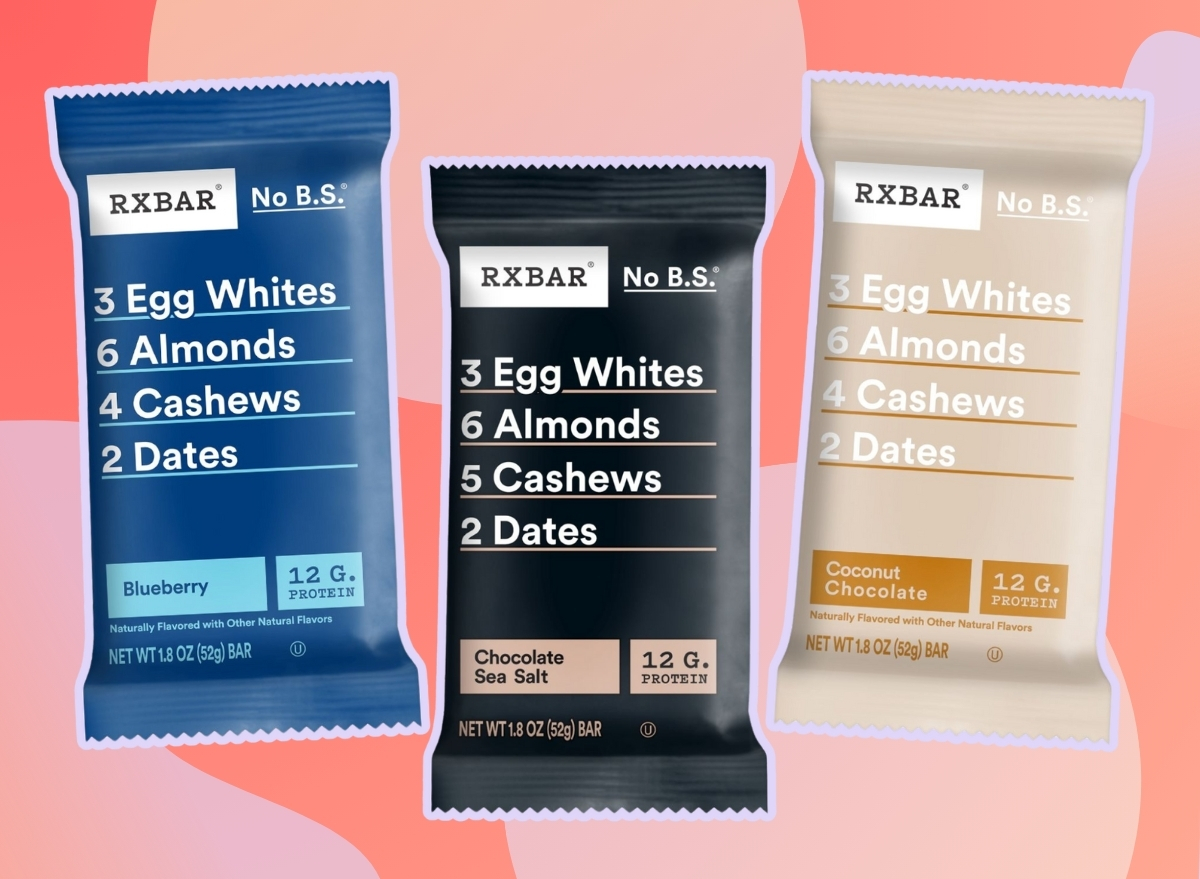
Whether you're hitting the gym, need a convenient midday snack, or want a quick meal replacement, protein bars have become a go-to option for many Americans who don't always have time to prepare nutritious meals from scratch. However, not all protein bars are created equal. Many can conceal hidden fats, sodium, and sugars from sources some people are trying to avoid—ingredients that are often used to enhance flavor and improve texture but can quickly detract from potential nutritional benefits.
In response, better-for-you brands have emerged, aiming to change the narrative around protein bars. Brands like RXBars, in particular, tout the importance of ingredient transparency, whole food sources of protein and non-artificial ingredients. Within 200-220 calories per bar, RXBars provide 12 grams of protein with no added sugars—a stark contrast to other popular brands that can contain double the calories and sugar levels that exceed daily recommended limits (25 grams for women and 36 grams for men).
While RXBars may seem like a smart choice for the average consumer, it's important to consider a few health factors before stocking up. Everyone has unique nutritional needs, and the right protein bar should align with those individual goals. Read on to discover what RXBars offer and how they might fit into a healthy, active lifestyle.
What are RXBars?
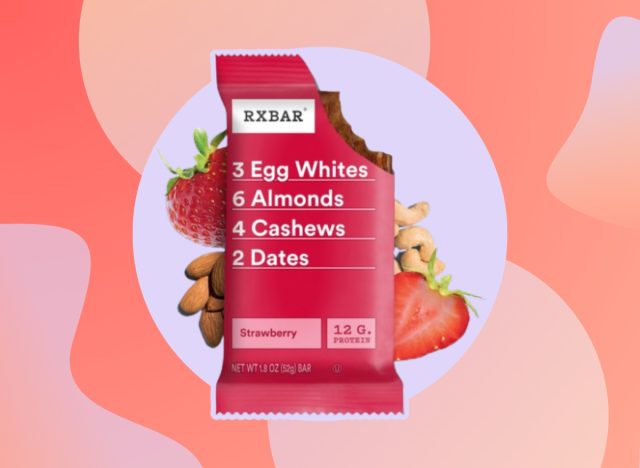
RXBars are protein bars made with simple, wholesome ingredients, setting them apart from many other options on the market that are often packed with artificial colors, flavors, and sweeteners. The front of each RXBar package transparently lists the core ingredients, making it easy for consumers to see what's inside.
Unlike many other protein bars, RXBars source their protein from real foods rather than common options like processed soy, pea, whey, or rice. All RXBars products are gluten-free, meeting the FDA's mandate of containing less than 20 parts per million of gluten.
Each RXBar contains at least two egg whites, some form of nuts (such as peanuts, cashews, or almonds), and something sweet (like dates). Depending on the flavor, RXBars contain 200-220 calories and deliver 12 grams of protein per serving. Note this refers to their core line of bars.
RXBars are available in a variety of flavors, including Vanilla Almond, Strawberry, Chocolate Sea Salt, and Blueberry Cashew Butter. Nutritional content usually hovers around similar caloric and fat contents; however, sugars can vary between bars due to the amount of natural sweeteners used.
These bars are designed as a high-protein snack rather than a meal replacement and can be enjoyed at any time of day. They're also popular before or after workouts to aid in the recovery process.
Nutrition Example, RXBAR Vanilla Almond Flavor:
Calories: 190
Fat: 7 g (Saturated fat: 1 g)
Sodium: 200 mg
Carbs: 24 g (Fiber: 5 g, Sugar: 16 g)
Protein: 12 g
Health Benefits of RXBars
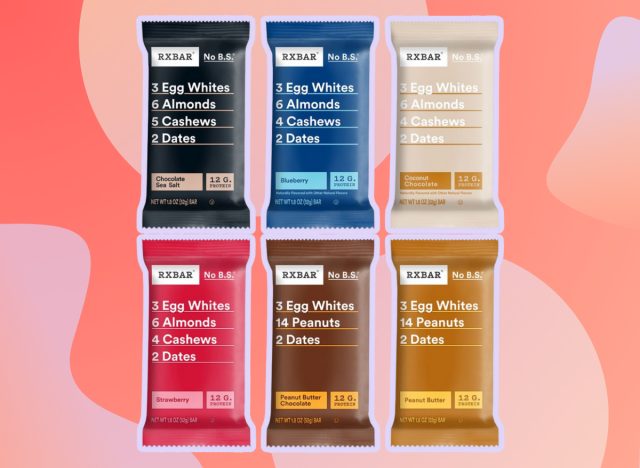
RXBars contain notable potential health benefits when compared to other protein bars on the market.
Portion-Controlled and Low in Calories
RXBars contain only 200-220 calories per bar—and 100 calories per mini bar—making them a suitable snack for those focused on maintaining a healthy weight. With snacking accounting for about ⅓ of an average American adult's daily caloric intake, RXBars offer a lower-calorie alternative compared to many other snacks, allowing for more caloric leeway during meals. The FDA recommends about 2,000 calories per day for the average, healthy adult, and these bars constitute only 10% of your daily intake. Since they are individually packaged, they also promote portion control, a key factor in weight management and weight loss.
High Protein Content for Satiety and Weight Management
Each RXBar, no matter what flavor, contains 12 grams of protein from nuts and egg whites. Egg whites, provide ample protein without the cholesterol levels found in the egg yolk and also offer antioxidants and anti-inflammatory properties.
The amount of protein to consume for optimal satiety varies per person, but research suggests that eating meals between 25-30 grams of protein can help manage body weight and appetite while also reducing cardiovascular risks.
Though RXBars aren't meal replacements, 12 grams of protein is about half the amount of a protein-packed meal and should be an ample amount to tide most people over to their next meal, helping curb hunger and reduce compulsive snacking.
Fiber for Digestive Health, Weight Management, and Blood Sugar Control
RXBars are a good source of fiber, with our vanilla almond example flavor containing 5 grams of fiber per bar. Although often overlooked on the nutrition label, fiber has plenty of health benefits.
Fiber, especially soluble fibers, promotes feelings of satiety thereby curbing hunger and potentially reducing overall calorie intake. Therefore, fiber is a key nutrient when it comes to proper weight maintenance. But even if you're not looking to RXBars to aid in trimming down your waistline, fiber is a nutrient powerhouse that not only regulates the metabolism but also helps lower "bad" cholesterol levels and may even prevent blood sugar spikes in both those who are living with diabetes and those who are looking for prevention measures.
Free from Artificial Ingredients
Lastly—and while we don't want to fear monger—RXBars contain zero artificial dyes, artificial sweeteners, or artificial flavors, relying instead on natural sweeteners like honey, dates, or coconut sugar.
Growing scientific evidence is mounting against the overuse of certain artificial sweeteners such as sorbitol, which is linked to gastrointestinal discomfort, erythritol, which may increase consumer risk for cardiovascular disease, and aspartame, which may also increase the risk of cardiovascular events such as heart attack or stroke.
Not all artificial ingredients are "bad," though, and many consumers will never face any issues when consuming artificial sweeteners. That being said, however, so many better-for-you brands are creating delicious products without artificial ingredients, and we're happy to see RXBars following suit.
Health Drawbacks of RXBars
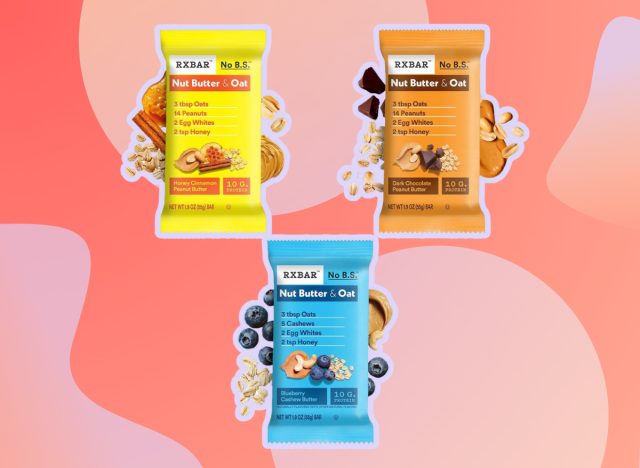
High Sugar in Certain Flavors
While the traditional original RXBars are free from added sugar, some of the newer varieties do contain some, specifically those under their newer Nut Butter and Oat category. Some of these varieties, like "Honey Cinnamon Peanut Butter" and "Dark Chocolate Peanut Butter," contain 10-11 grams of sugar—nearly half of the recommended daily limit.
As mentioned earlier, the American Heart Association recommends that the average, healthy female adult eat no more than 25 grams of added sugar per day while males should aim for 36 grams or less. Americans are eating far too much added sugar—more than 2-3 times the recommended amount per day—and this overconsumption can lead to health risks including obesity, type-2 diabetes, cardiovascular disease, and even non-alcoholic fatty liver disease.
To limit sugar intake, opt for flavors with little to no added sugar, such as Vanilla Almond, Strawberry, or Blueberry. Just keep in mind that these bars are not sugar-free — just free from added sugars. For example, the Blueberry variety is free from added sugars, but it does contain 15 grams of sugar from natural sources, like dates. If you are focused on limiting your overall sugar intake, it is important to be mindful of this detail.
Unsuitable for Certain Dietary Needs
Although this doesn't negate their health benefits, we want to note that RXBars are not suitable for all dietary lifestyles. Due to the presence of egg whites, no RXBars are suitable for vegans or those with egg allergies. Additionally, they are not safe for individuals with peanut or tree nut allergies. On the other hand, RXBars are gluten-free, making them suitable for those with Celiac disease or gluten sensitivities
Bottom Line: Are RXBars Healthy?
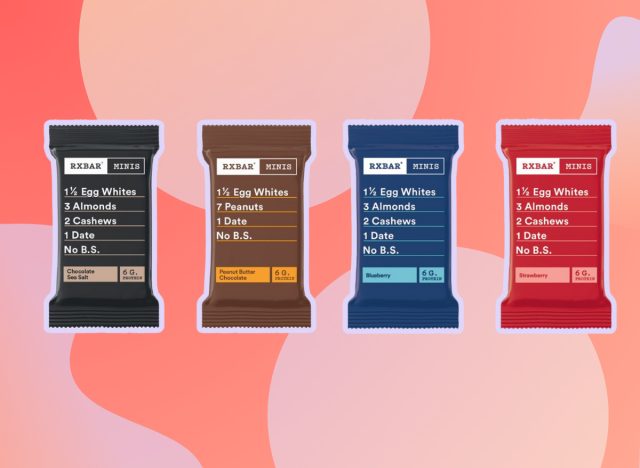
Overall, RXBars can be a healthy addition to your diet. Like most snack foods, protein bars act as "mini-meals," offering enough protein to tide you over until your next meal. In our opinion, RXBars are not intended to be meal replacement bars as they may not help you reach levels of satiety found with higher-protein, higher-fiber meals. Note if you are aiming for limiting your added sugar intake, ensure the variety you are choosing is free from this addition, as varieties under their Nut Butter & Oat umbrella do have some added sugars added to the mix.
We recommend enjoying RXBars as a mid-morning or afternoon snack, especially during those times when energy dips and hunger starts creeping in. You can also pair an RXBar with other nourishing foods to create a more balanced meal. The combination of natural sugars and protein can help stabilize blood sugar, curb cravings, and provide an energy boost to get you through the day. Just be sure to choose flavors with little to no added sugar, as excess sugar can come with health risks.
- Source: https://pubmed.ncbi.nlm.nih.gov/32448575/
- Source: https://www.heart.org/en/healthy-living/healthy-eating/eat-smart/sugar/added-sugars
- Source: https://www.fda.gov/media/91945/download#:~:text=The%20rule%20specifies%2C%20among%20other,using%20scientifically%20validated%20analytical%20methods.
- Source: https://www.ncbi.nlm.nih.gov/pmc/articles/PMC5015032/
- Source: https://www.fda.gov/food/nutrition-facts-label/calories-nutrition-facts-label
- Source: https://www.ncbi.nlm.nih.gov/pmc/articles/PMC4105579/
- Source: https://www.ncbi.nlm.nih.gov/pmc/articles/PMC7400894/
- Source: https://pubmed.ncbi.nlm.nih.gov/34962122/
- Source: https://pubmed.ncbi.nlm.nih.gov/25926512/#:~:text=Collectively%2C%20these%20data%20suggest%20that,protein;%20satiety;%20weight%20management.
- Source: https://www.ncbi.nlm.nih.gov/pmc/articles/PMC6768815/
- Source: https://pubmed.ncbi.nlm.nih.gov/33208922/
- Source: https://pubmed.ncbi.nlm.nih.gov/31266545/
- Source: https://pubmed.ncbi.nlm.nih.gov/32142510/
- Source: https://www.ncbi.nlm.nih.gov/pmc/articles/PMC6693595/
- Source: https://www.nature.com/articles/s41591-023-02223-9
- Source: https://www.ncbi.nlm.nih.gov/pmc/articles/PMC9449855/
- Source: https://www.heart.org/en/healthy-living/healthy-eating/eat-smart/sugar/how-much-sugar-is-too-much
- Source: https://pubmed.ncbi.nlm.nih.gov/31246081/









